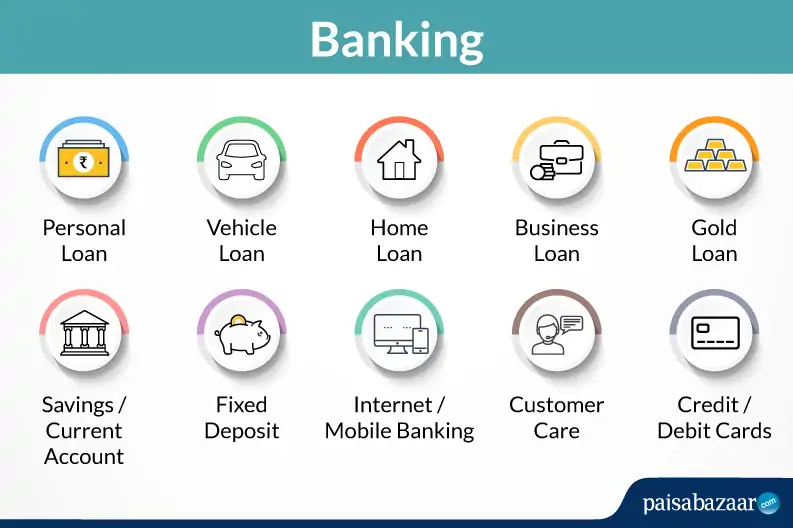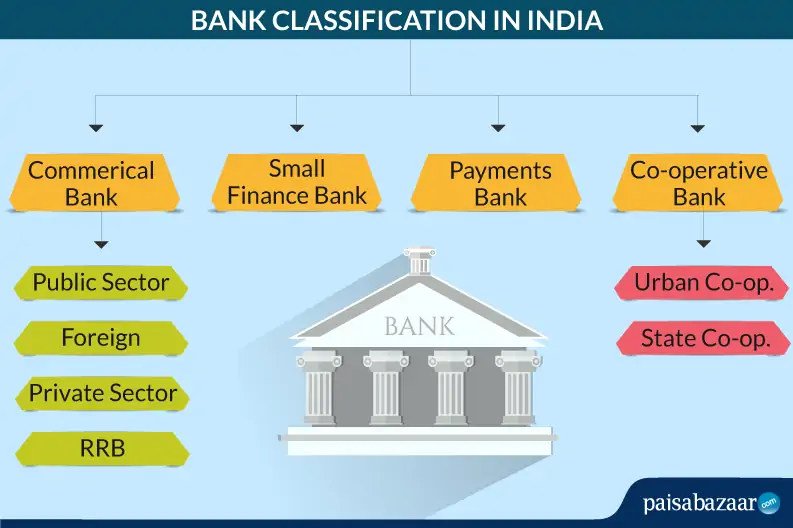The banking industry handles finances in a country including cash and credit. Banks are the institutional bodies that accept deposits and grant credit to the entities and play a major role in maintaining the economic stature of a country. Given their importance in the economy, banks are kept under strict regulation in most of the countries. In India, the Reserve Bank of India (RBI) is the apex banking institution that regulates the monetary policy in the country.
Free Credit Score
Get your credit report free, with monthly updates.
Full Name Mobile Number Note: We will verify this number on the next step. Email Address I hereby appoint Paisabazaar as my authorised representative to receive my credit information from Cibil / Equifax / Experian / Highmark (bureau). Moreहिंदी में पढ़ेUpdated: 24-03-2021 05:44:05 AM
The banking industry handles finances in a country including cash and credit. Banks are the institutional bodies that accept deposits and grant credit to the entities and play a major role in maintaining the economic stature of a country. Given their importance in the economy, banks are kept under strict regulation in most of the countries. In India, the Reserve Bank of India (RBI) is the apex banking institution that regulates the monetary policy in the country.

Classification of Banks in India
Banks are classified into classified into four categories –
- Commercial Banks
- Small Finance Banks
- Payments Banks
- Co-operative Banks
Commercial Banks can be further classified into public sector banks, private sector banks, foreign banks and Regional Rural Banks (RRB). On the other hand, cooperative banks are classified into urban and rural. Apart from these, a fairly new addition to the structure is payments bank.

Commercial Banks are regulated under the Banking Regulation Act, 1949 and their business model is designed to make profit. Their primary function is to accept deposits and grant loans to the general public, corporate and government. Commercial banks can be divided into-
| Public Sector Banks | Private Sector Banks |
| Foreign Banks | Regional Rural Banks |
Public Sector Banks
These are the nationalised banks and account for more than 75 per cent of the total banking business in the country. Majority of stakes in these banks are held by the government. In terms of volume, SBI is the largest public sector bank in India and after its merger with its 5 associate banks (as on 1st April 2017) it has got a position among the top 50 banks of the world.
There are a total of 12 nationalised banks in the country namely below:
| Bank of Maharashtra | Indian Bank |
| Bank of Baroda | Punjab & Sind Bank |
| Bank of India | Punjab National Bank |
| Canara Bank | State Bank of India |
| Central Bank of India | Union Bank of India |
| Indian Overseas Bank | UCO Bank |
These include banks in which major stake or equity is held by private shareholders. All the banking rules and regulations laid down by the RBI will be applicable on private sector banks as well. Given below is the list of private-sector banks in India-
A foreign bank is one that has its headquarters in a foreign country but operates in India as a private entity. These banks are under the obligation to follow the regulations of its home country as well as the country in which they are operating. Given below is the list of foreign banks operating in India –
| List of Foreign Banks in India | ||
| Australia and New Zealand Banking Group Ltd. | National Australia Bank | Westpac Banking Corporation |
| Bank of Bahrain & Kuwait BSC | AB Bank Ltd. | Sonali Bank Ltd. |
| Bank of Nova Scotia | Industrial & Commercial Bank of China Ltd. | BNP Paribas |
| Credit Agricole Corporate & Investment Bank | Societe Generale | Deutsche Bank |
| HSBC Bank | PT Bank Maybank Indonesia TBK | Mizuho Bank Ltd. |
| Sumitomo Mitsui Banking Corporation | MUFG Bank, Ltd. | Cooperatieve Rabobank U.A. |
| Doha Bank Q.P.S.C | Qatar National Bank (Q.P.S.C.) | JSC VTB Bank |
| Sberbank | United Overseas Bank Ltd | FirstRand Bank Ltd |
| Shinhan Bank | Woori Bank | KEB Hana Bank |
| Industrial Bank of Korea | Bank of Ceylon | Credit Suisse A.G |
| CTBC Bank Co., Ltd. | Krung Thai Bank Public Co. Ltd. | Abu Dhabi Commercial Bank Ltd. |
| Mashreq Bank PSC | First Abu Dhabi Bank PJSC | Emirates Bank NBD |
| Barclays Bank Plc. | Standard Chartered Bank | The Royal Bank of Scotland plc |
| American Express Banking Corporation | Bank of America | Citibank |
| J.P. Morgan Chase Bank N.A | Kookmin Bank | SBM Bank (India) Limited |
| DBS Bank India Limited |
These are also scheduled commercial banks but they are established with the main objective of providing credit to weaker sections of the society like agricultural labourers, marginal farmers and small enterprises. They usually operate at regional levels in different states of India and may have branches in selected urban areas as well. Other important functions carried out by RRBs include-
- Providing banking and financial services to rural and semi-urban areas
- Government operations like disbursement of wages of MGNREGA workers, distribution of pensions, etc.
- Para-Banking facilities like debit cards, credit cards and locker facilities
This is a niche banking segment in the country and is aimed to provide financial inclusion to sections of the society that are not served by other banks. The main customers of small finance banks include micro industries, small and marginal farmers, unorganized sector entities and small business units. These are licensed under Section 22 of the Banking Regulation Act, 1949 and are governed by the provisions of RBI Act, 1934 and FEMA.
| Au Small Finance Bank Ltd. | Jana Small Finance Bank Ltd. |
| Capital Small Finance Bank Ltd. | North East Small Finance Bank Ltd. |
| ESAF Small Finance Bank Ltd. | Suryoday Small Finance Bank Ltd. |
| Equitas Small Finance Bank Ltd. | Utkarsh Small Finance Bank Ltd. |
| Fincare Small Finance Bank Ltd. | Ujjivan Small Finance Bank Ltd. |
This is a relatively new model of bank in the Indian Banking industry. It was conceptualised by the RBI and is allowed to accept a restricted deposit. The amount is currently limited to Rs. 1 Lakh per customer. They also offer services like ATM cards, debit cards, net-banking and mobile-banking.Co-operative Banks
Co-operative banks are registered under the Cooperative Societies Act, 1912 and they are run by an elected managing committee. These work on no-profit no-loss basis and mainly serve entrepreneurs, small businesses, industries and self-employment in urban areas. In rural areas, they mainly finance agriculture-based activities like farming, livestock and hatcheries.
| Urban Co-operative Banks | State Co-operative Banks |
Urban Co-operative Banks refer to the primary cooperative banks located in urban and semi-urban areas. These banks essentially lent to small borrowers and businesses centered around communities, localities work place groups.
According to the RBI, on 31st March, 2003 there were 2,104 Urban Co-operative Banks of which 56 were scheduled banks. About 79% of these are located in five states, – Andhra Pradesh, Gujarat, Karnataka, Maharashtra and Tamil Nadu.State Co-operative Banks
A State Cooperative Bank is a federation of the central cooperative bank which acts as custodian of the cooperative banking structure in the State.
Banks can also be classified on the basis of Scheduled and Non-Scheduled Banks. It is essential for every individual to check if they are holding their savings or deposit account with a Scheduled Bank or Non-Scheduled Bank. Scheduled Banks are also covered under the depositor insurance program of Deposit Insurance and Credit Guarantee Corporation (DICGC), which is beneficial for all the account holders holding a savings and fixed / recurring deposit account. Under DICGC, bank deposits of up to Rs 1 lakh, including the fixed, savings, current and recurring deposits, per depositor per bank in the event of bank failure are insured.Scheduled Banks
Scheduled banks are covered under the 2nd Schedule of the Reserve Bank of India Act, 1934. To qualify as a scheduled bank, the bank should conform to the following conditions:
- A bank that has a paid-up capital of Rs. 5 Lakh and above qualifies for the schedule bank category
- A bank requires to satisfy the central bank that its affairs are not carried out in a way that causes harm to the interest of the depositors
- A bank should be a corporation rather than a sole-proprietorship or partnership firm
Non-scheduled Banks
Non-scheduled banks refer to the local area banks which are not listed in the Second Schedule of Reserve Bank of India. Non-Scheduled Banks are also required to maintain the cash reserve requirement, not with the RBI, but with them.
